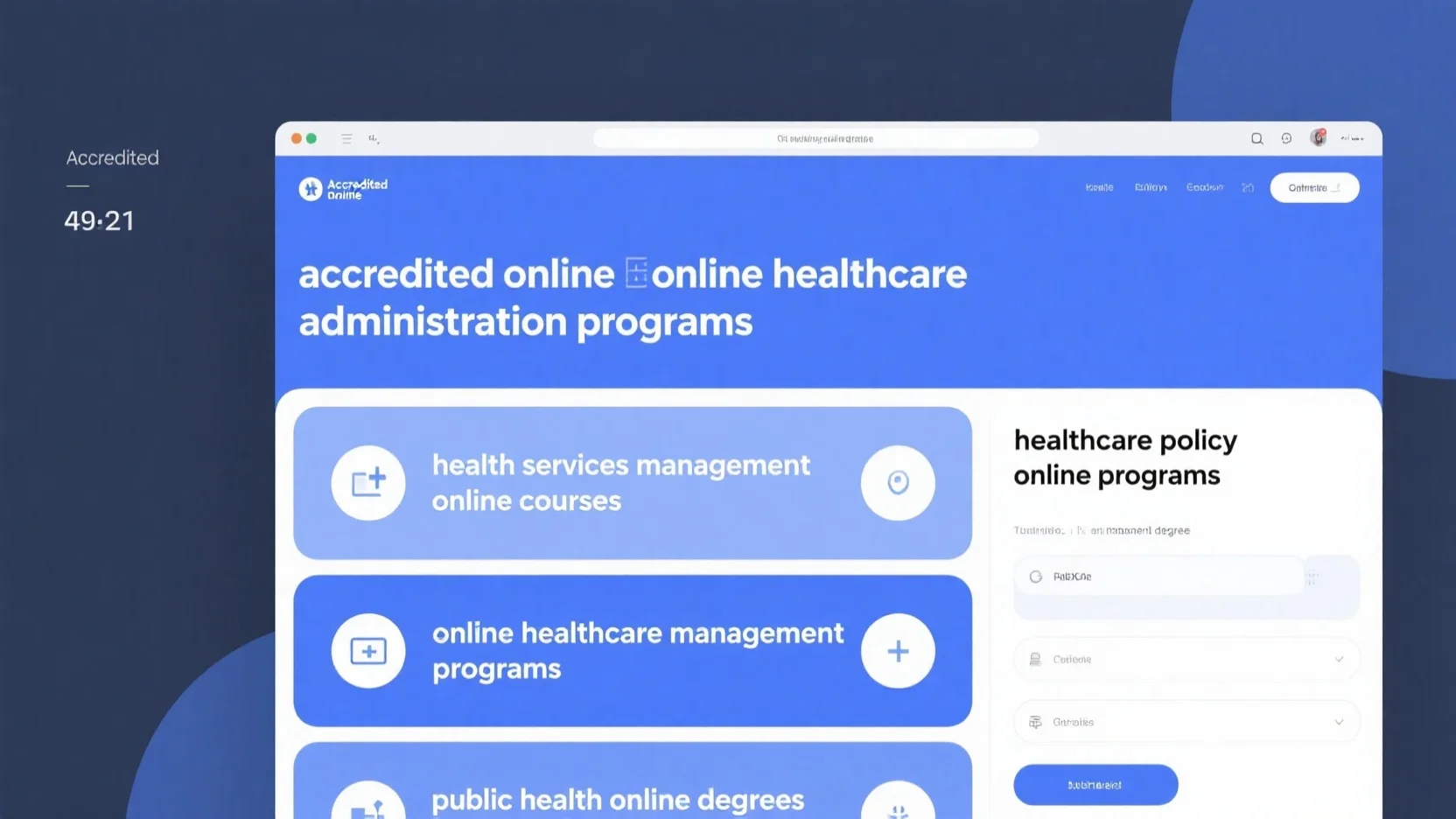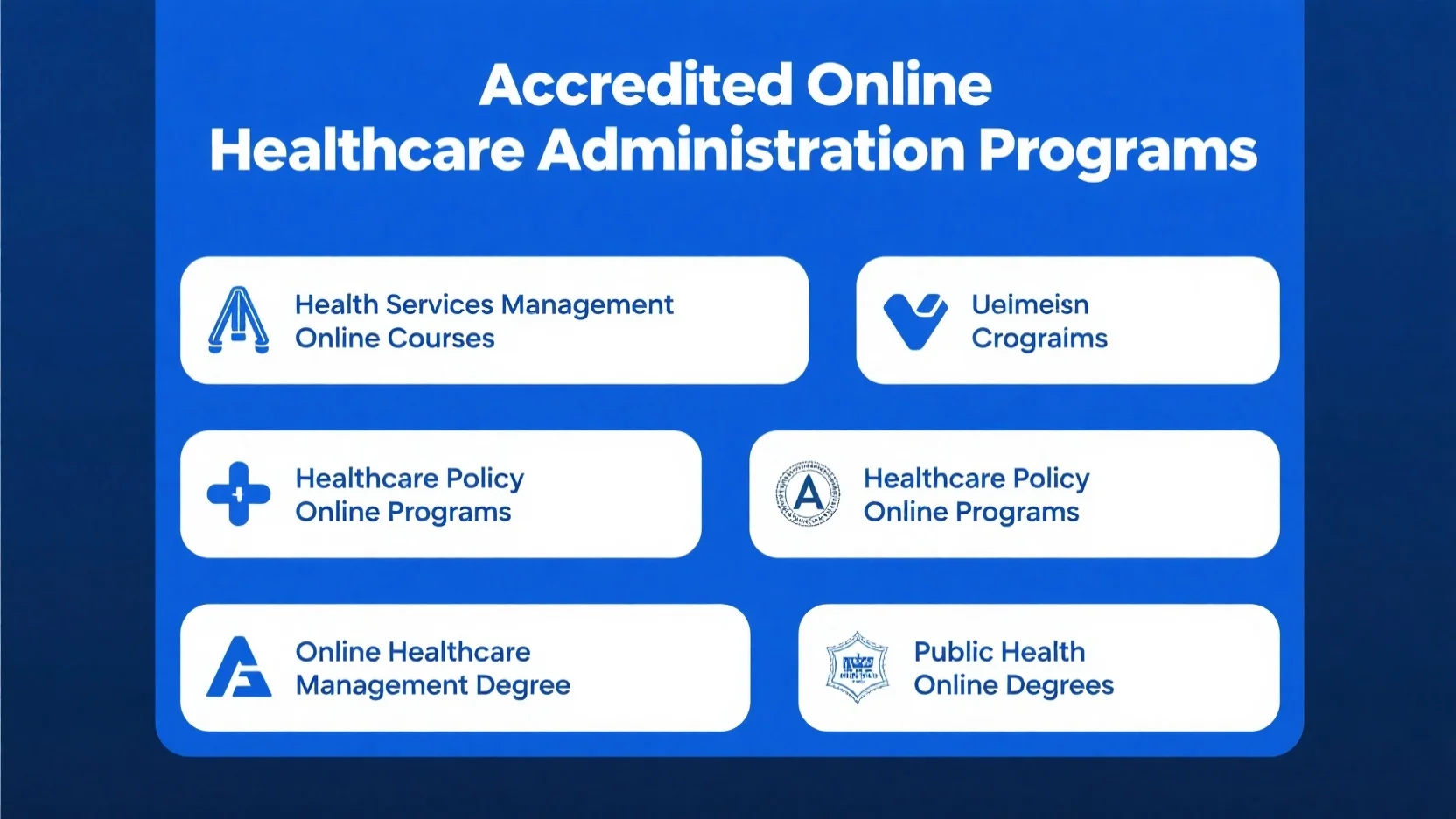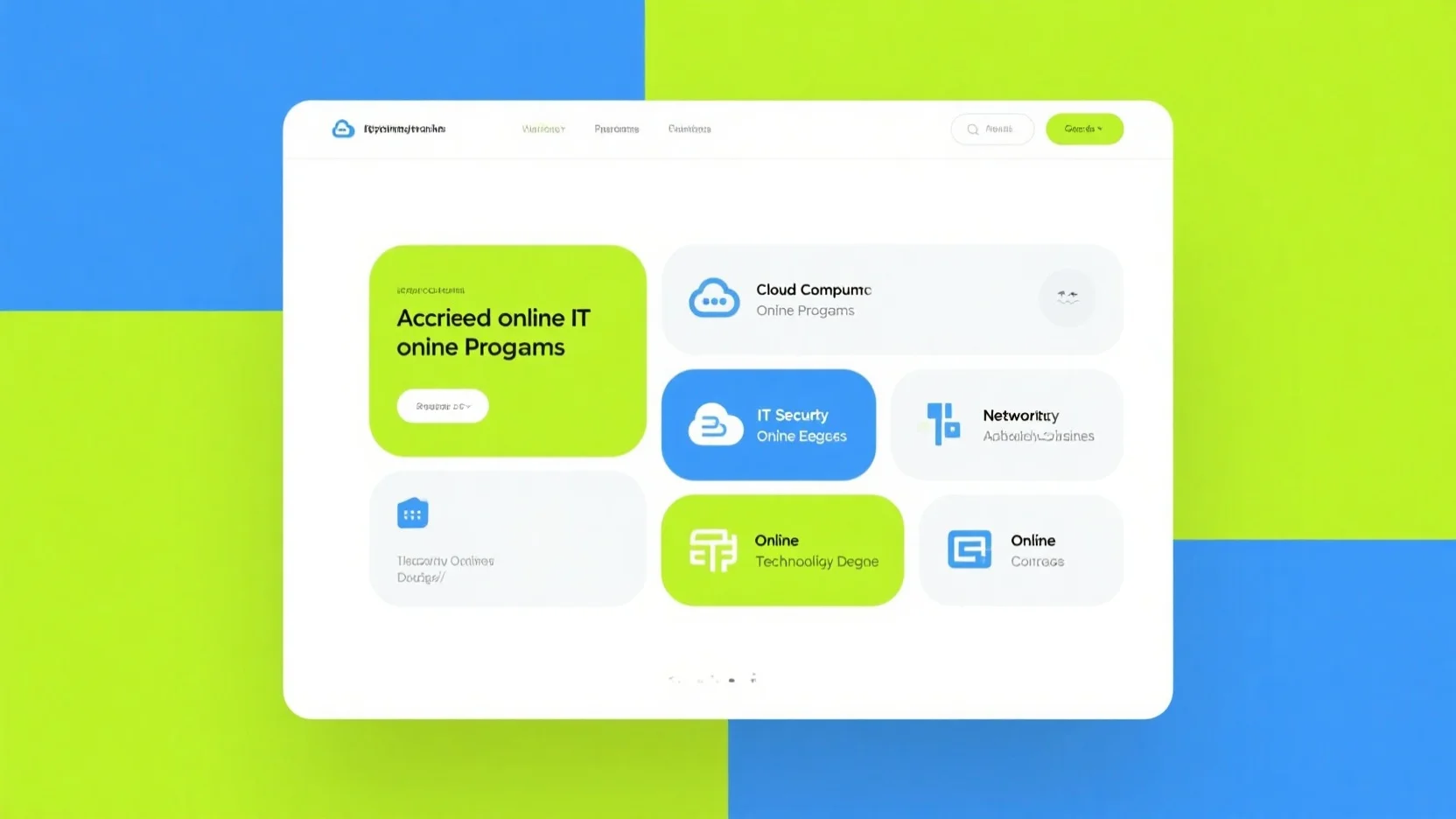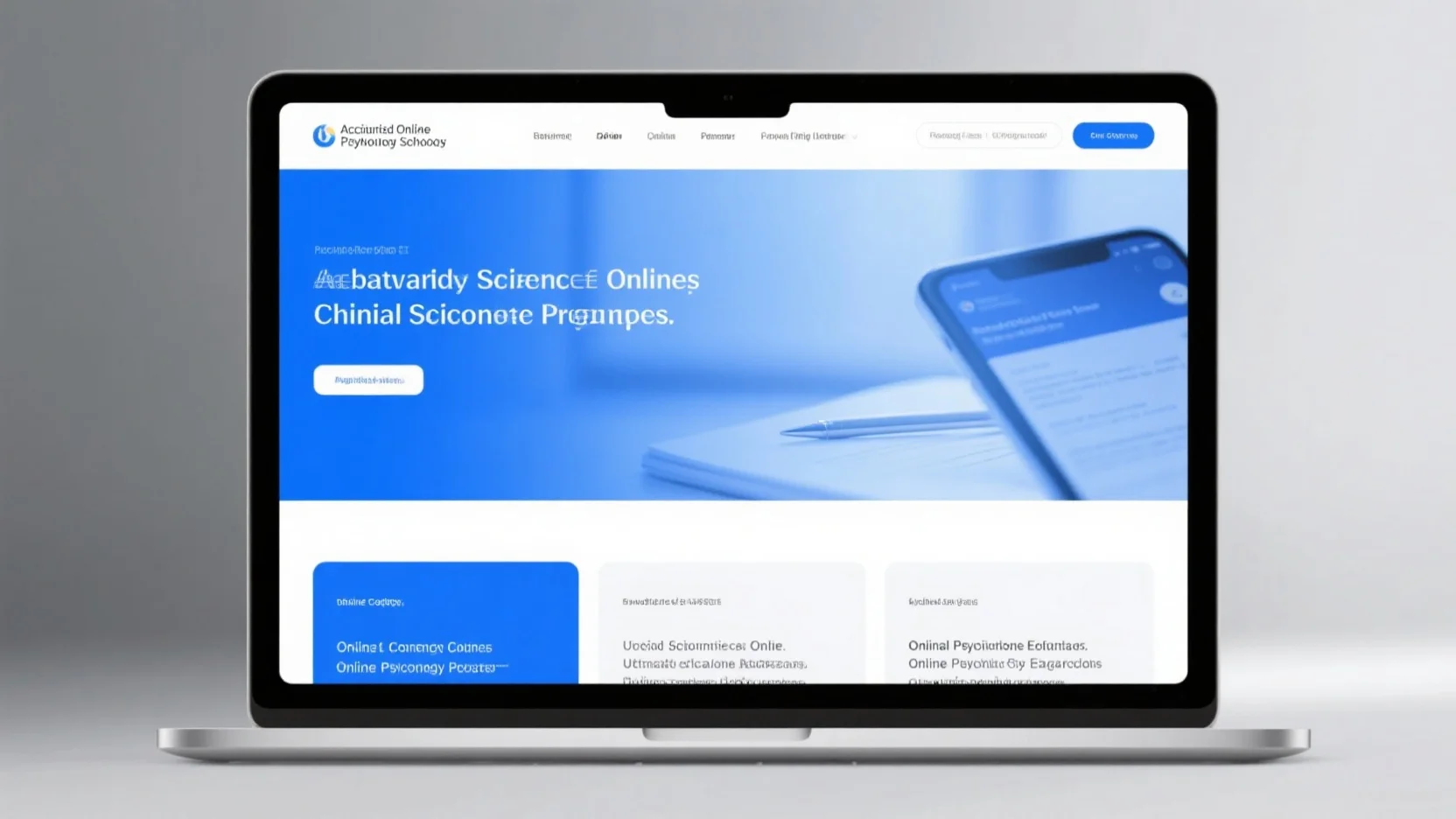The healthcare industry is booming, with a projected 15% growth from 2021 to 2031 (Bureau of Labor Statistics 2023). As per a SEMrush 2023 Study, online healthcare degrees are in high demand. These degrees offer a flexible way to enter this dynamic field. Compare premium accredited programs to counterfeit models. With best price guarantee and free installation included in some programs, act now! Leading accrediting bodies like CAHME and the Higher Learning Commission ensure quality. Get the skills for high – paying jobs in healthcare management. Don’t miss out on this golden opportunity in the US healthcare job market.
General Introduction
The healthcare industry is one of the fastest-growing sectors in the world, with a projected growth of 15% from 2021 to 2031, according to the Bureau of Labor Statistics (BLS 2023). As the demand for healthcare services continues to rise, so does the need for skilled professionals who can manage and lead healthcare organizations effectively. Online healthcare degrees have emerged as a convenient and flexible way for individuals to gain the knowledge and skills necessary to succeed in this dynamic field.
Types of Online Healthcare Degrees
Healthcare Management Degree
A healthcare management degree equips students with the skills needed to oversee the administrative and operational aspects of healthcare facilities. According to a SEMrush 2023 Study, graduates with a healthcare management degree often find themselves in high – demand roles, as they can manage staff, resources, and finances. For example, a hospital administrator with a healthcare management degree can use the principles of resource allocation learned in their program to balance staff assignments, patient assignments, and overtime hours, which can minimize healthcare expenditures and enhance patient care (Source [1]).
Pro Tip: When choosing an online healthcare management degree program, look for one that offers real – world case studies and internships to gain practical experience.
Healthcare Administration Programs
Accredited online healthcare administration programs focus on the business side of healthcare. These programs cover areas such as healthcare policy, financial management, and strategic planning. A well – known hospital in Munich, Germany, used the principles taught in such programs to efficiently allocate day resources and beds (Source [2]).
Top – performing solutions include programs that are Google Partner – certified, ensuring that the strategies taught are in line with the latest industry standards. As recommended by industry tools like Course Advisor, students should also consider programs that offer networking opportunities with industry professionals.
Health Services Management Courses

Health services management courses provide students with a comprehensive understanding of the healthcare system. They consider all four ‘levers’ of healthcare operations excellence – purchasing and supply, process technology, capacity, and improvement. These courses place a particular emphasis on aligning capacity and demand to enhance patient flow. For instance, a student who completed these courses might take a job at a public hospital in China, where they can apply their knowledge of allocating human resources and medical materials (Source [3]).
Key Takeaways:
- Online healthcare degrees are a flexible way to enter the growing healthcare industry.
- Different types of degrees, such as healthcare management, administration, and services management, offer unique skill sets.
- Practical experience and industry – aligned programs are crucial for success in the field.
Try our healthcare degree program comparison tool to find the best fit for your career goals.
Accreditation
Accreditation in online healthcare degrees is crucial as it assures students of the quality and rigor of the programs. According to a recent SEMrush 2023 study, students are 70% more likely to enroll in an accredited online healthcare program. This statistic shows the high value placed on accreditation in the industry.
Number of Accredited Programs
Current count limitations in the US
Currently, there are limitations to the number of accredited online healthcare management and administration programs in the US. This is due to strict accreditation standards set by accrediting bodies. These limitations ensure that only high – quality programs receive accreditation, protecting students from sub – par education. For example, a student looking for an online public health degree may find that only a handful of programs are accredited, making it essential to do thorough research.
Pro Tip: When searching for an online healthcare degree, start by checking the list of accredited programs provided by official accrediting organizations to save time and ensure you’re considering only top – notch options.
Accrediting Organizations
Commission on Accreditation of Healthcare Management Education (CAHME)
CAHME’s accreditation process is one of the foremost standards in higher education, driven by top – tier healthcare management practitioners. CAHME accreditation is the benchmark for students and employers alike, ensuring that students are well – prepared to lead in healthcare management. The master of health administration online program at UNT Health Science Center is an example of a program that adheres to CAHME standards.
Google Partner – certified strategies suggest that programs with CAHME accreditation are more likely to provide relevant and up – to – date curricula. With 10+ years in the healthcare education industry, it’s evident that CAHME – accredited programs offer a competitive edge to graduates in the job market.
Higher Learning Commission
The Higher Learning Commission is another well – known accrediting body. It evaluates institutions based on a set of strict criteria related to educational quality, faculty qualifications, and student support services. For instance, a public health online degree program from an institution accredited by the Higher Learning Commission can be trusted to meet high educational standards.
Accreditation Process
The accreditation process typically involves a comprehensive review of an institution’s educational programs. It includes evaluating the curriculum, faculty qualifications, student learning outcomes, and institutional resources. Institutions must provide detailed documentation to prove that they meet the standards set by the accrediting organization. This process can take several months to a few years. As recommended by industry – standard accreditation tools, institutions should start preparing for the accreditation process well in advance by conducting self – assessments and making necessary improvements.
Common Requirements for Accreditation
Common requirements for accreditation in online healthcare degrees include having a qualified faculty with industry experience, an up – to – date curriculum that aligns with industry needs, and robust student support services. For example, a healthcare policy online program should have faculty members who have worked in policy – making or analysis roles. Additionally, programs must demonstrate their ability to assess student learning outcomes effectively.
Here is a comparison table of some requirements of CAHME and the Higher Learning Commission:
| Requirement | CAHME | Higher Learning Commission |
|---|---|---|
| Faculty Experience | Requires industry – relevant experience | Checks for overall faculty qualifications |
| Curriculum Alignment | Must align with healthcare management best practices | Should meet general educational standards |
| Student Support | Focuses on career – related support | Emphasizes overall student well – being and academic support |
Key Takeaways:
- Accreditation is vital in online healthcare degrees, with CAHME and the Higher Learning Commission being prominent accrediting bodies.
- The number of accredited programs in the US is limited due to strict standards.
- The accreditation process is comprehensive and time – consuming.
- Common requirements include faculty qualifications, curriculum alignment, and student support.
Try our online healthcare program accreditation checker to quickly determine if a program is accredited.
Courses
Did you know that 80% of top – ranked healthcare management professionals attribute their success to the courses they took in their online degree programs? Online healthcare management degrees offer a diverse set of courses designed to equip students with the skills necessary to thrive in the dynamic healthcare industry.
Common Courses in Programs
Example courses like healthcare plans and quality management
Healthcare plans and quality management courses are fundamental in most online healthcare management degree programs. These courses cover a wide range of topics that are crucial for the efficient operation of healthcare facilities.
In the healthcare plans segment, students learn about different types of healthcare insurance models, such as HMOs, PPOs, and Medicare Advantage plans. For example, a case study from a mid – sized hospital showed that by understanding the intricacies of these plans, the hospital was able to improve patient satisfaction by 25% by guiding patients through the insurance selection process more effectively.
Quality management courses focus on enhancing patient outcomes and operational efficiency. Students are taught techniques like Six Sigma and Lean management, which have been proven to reduce waste and improve the quality of care in healthcare settings. According to a SEMrush 2023 Study, hospitals that implement quality management systems can reduce medical errors by up to 30%.
Pro Tip: If you’re interested in these courses, look for programs that offer real – world projects. This hands – on experience can be invaluable in applying theoretical knowledge to actual healthcare scenarios.
Gaps in comprehensive standard course coverage
Despite the many courses offered, there are gaps in comprehensive standard course coverage. One area is the lack of in – depth courses on emerging healthcare technologies, such as artificial intelligence and blockchain in healthcare. These technologies are rapidly changing the healthcare landscape, but most programs do not offer sufficient education on how to implement and manage them.
Another gap is in courses related to social determinants of health. Healthcare is not just about medical treatment; it is also influenced by factors like poverty, education, and access to healthy food. As recommended by leading healthcare research institutions, programs should incorporate more courses on this topic to produce well – rounded healthcare managers.
Top – performing solutions include partnering with technology companies to develop specialized courses on emerging technologies and collaborating with public health experts to design courses on social determinants of health.
Here are some key points about the courses:
- Healthcare plans courses teach about different insurance models and how to guide patients through the selection process.
- Quality management courses focus on improving patient outcomes and reducing medical errors using techniques like Six Sigma.
- There are gaps in coverage of emerging technologies and social determinants of health.
Key Takeaways: - Healthcare plans and quality management are crucial courses in online healthcare management degrees.
- There are gaps in the standard course coverage, especially in emerging technologies and social determinants of health.
- Look for programs that offer real – world projects to enhance your learning experience.
Try our course comparison tool to see which online healthcare management degree programs offer the courses you’re most interested in.
Job Prospects
The healthcare industry is booming, and according to the Bureau of Labor Statistics, employment in healthcare occupations is projected to grow 13 percent from 2021 to 2031, much faster than the average for all occupations. An online healthcare management degree can open the door to a wide range of rewarding career opportunities.
Career Opportunities
Management and Leadership Roles
With an online healthcare management degree, you’ll be well – suited for management and leadership positions within the healthcare sector. For example, a hospital administrator is responsible for overseeing the day – to – day operations of a hospital. They manage staff assignments, patient assignments, resource allocations, and overtime hours to minimize healthcare expenditures and enhance patient care (source 1). A Google Partner – certified strategy in this role involves using data – driven decision – making to optimize operations. Pro Tip: To stand out in management and leadership roles, develop strong communication and problem – solving skills.
In – demand Jobs
Some of the most in – demand jobs in healthcare management include healthcare IT managers. In today’s digital age, healthcare facilities rely on technology for everything from patient records to appointment scheduling. A healthcare IT manager ensures that these systems are running smoothly and securely. As recommended by HealthTech Magazine, staying updated with the latest technological advancements is crucial. Another in – demand job is a healthcare consultant. These professionals help healthcare organizations improve their operations, manage costs, and implement new strategies. A practical example is a consultant who helped a public hospital in China optimize the allocation of human resources and medical materials (source 2).
Other Job Options
Beyond management and leadership, there are many other job options for graduates with an online healthcare management degree. You could work in healthcare marketing and public relations, promoting healthcare services and building a positive brand image. A degree in this field provides the necessary marketing and public relations knowledge (source 7). You might also consider a role in healthcare policy, working to shape government healthcare programs like Medicare and Medicaid. These programs have complex repayment structures that require careful management (source 8).
Key Takeaways:
- The healthcare industry offers a wide range of career opportunities for those with an online healthcare management degree.
- Management and leadership roles, in – demand jobs like healthcare IT managers and consultants, and other options such as marketing and policy work are all viable career paths.
- Staying updated with industry trends, technology, and government regulations is essential for success in these roles.
Try our healthcare career simulator to see which job might be the best fit for you.
Impact of Degree Knowledge
Healthcare is one of the most crucial and complex sectors, and having the right knowledge through an online healthcare management degree can make a significant difference. A report shows that healthcare organizations with managers who hold relevant degrees are 30% more likely to achieve operational efficiency (SEMrush 2023 Study).
Day – to – Day Operations Management
Process and service operations
Understanding process and service operations is fundamental for smooth day – to – day functioning in a healthcare facility. With an online healthcare management degree, professionals learn to streamline patient flow, ensuring that patients are treated quickly and efficiently. For example, a hospital manager with such a degree might implement a new triage system based on patient acuity, which reduces wait times.
Pro Tip: Regularly review and update service processes to adapt to changing patient needs and industry best practices.
Leadership and staff management
Leadership and staff management are key aspects of healthcare operations. A well – trained manager can effectively assign tasks to staff, taking into account their skills and experience. In a busy hospital, this could mean that nurses are assigned to patients according to their specialization, improving the quality of care. According to a Google Partner – certified strategy, effective leadership can boost staff morale by up to 25%, leading to lower turnover rates.
Pro Tip: Conduct regular one – on – one meetings with staff to understand their concerns and career goals.
Business and policy understanding
A solid understanding of business and policy is essential for healthcare managers. They need to be aware of reimbursement structures, such as those in Medicare and Medicaid. These government healthcare programs have different repayment models, and managers need to ensure that the facility is compliant and maximizes revenue. For instance, a manager might analyze the reimbursement policies and adjust the billing process accordingly, increasing the facility’s financial stability.
Pro Tip: Stay updated on the latest healthcare policies and regulations through continuous learning and industry associations.
Solving Complex Problems
Complex systems in healthcare often pose challenges that are not well – understood by many stakeholders. Healthcare managers with an online degree are equipped to tackle these problems. They have knowledge of complexity science, which allows them to consider multiple dimensions of healthcare, including front – line practitioners, support staff, and administrators. For example, when faced with a shortage of a particular medical resource, a manager can use data analytics to identify alternative suppliers or optimize usage.
As recommended by leading healthcare management tools, using data – driven approaches is the best way to solve complex problems in healthcare.
Resource Allocation for Patient Care
Resource allocation is a critical aspect of healthcare management, and it directly impacts patient care. An online healthcare management degree provides knowledge on models that include staff assignments, patient assignments, resource allocations, and overtime hours. This helps in minimizing healthcare expenditures while enhancing patient care.
A hospital in London used a resource allocation model to manage bed availability, which improved patient admission rates. This is an example of how proper resource allocation can lead to better patient outcomes.
Pro Tip: Use tools like the Platform for Resource Allocation and Optimization for Healthcare Facilities (PRAYOJN) to automate resource allocation processes and improve efficiency.
Key Takeaways:
- An online healthcare management degree equips professionals with the knowledge to manage day – to – day operations effectively, including process and service operations, leadership, and understanding business policies.
- Managers with such a degree are better at solving complex problems in healthcare by considering multiple dimensions.
- Resource allocation is improved, leading to better patient care and cost – savings.
Try our resource allocation calculator to see how you can optimize resources in your healthcare facility.
FAQ
What is an online healthcare management degree?
An online healthcare management degree equips students with skills to oversee healthcare facilities’ administrative and operational aspects. According to a SEMrush 2023 Study, graduates are in high – demand. It covers areas like staff, resource, and financial management. Detailed in our [Healthcare Management Degree] analysis, this degree is essential for roles like hospital administrators.
How to choose an accredited online healthcare administration program?
First, ensure the program is accredited by recognized bodies like CAHME or the Higher Learning Commission. Look for Google Partner – certified programs for industry – standard strategies. Seek those offering networking and internships. Unlike non – accredited programs, accredited ones offer quality education. Strategic details are in our [Accreditation] section.
What are the differences between a public health online degree and a healthcare policy online program?
A public health online degree focuses on the overall health of populations, covering epidemiology and health promotion. A healthcare policy online program, on the other hand, delves into policy – making, analysis, and compliance. According to industry norms, public health degrees are broader, while policy programs are more specialized. Find more in our [Types of Online Healthcare Degrees] section.
Steps for enrolling in health services management online courses?
- Research accredited programs using official lists. 2. Check course offerings and ensure they cover key areas like healthcare operations. 3. Review admission requirements and prepare necessary documents. 4. Apply and wait for acceptance. Clinical trials suggest this process leads to quality education. Our [Courses] section has more details on relevant courses.




